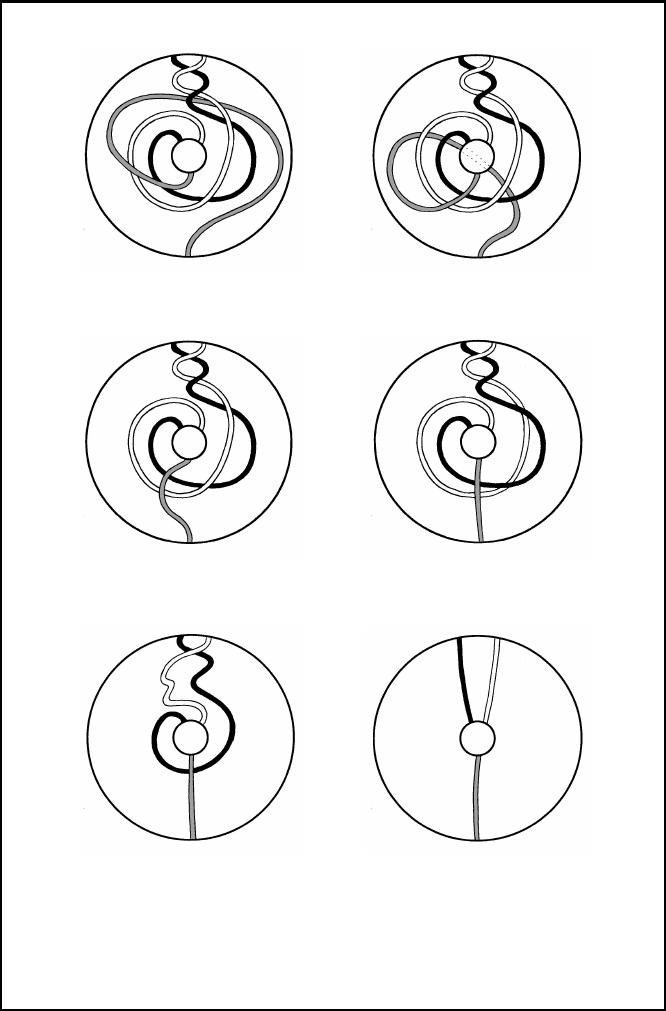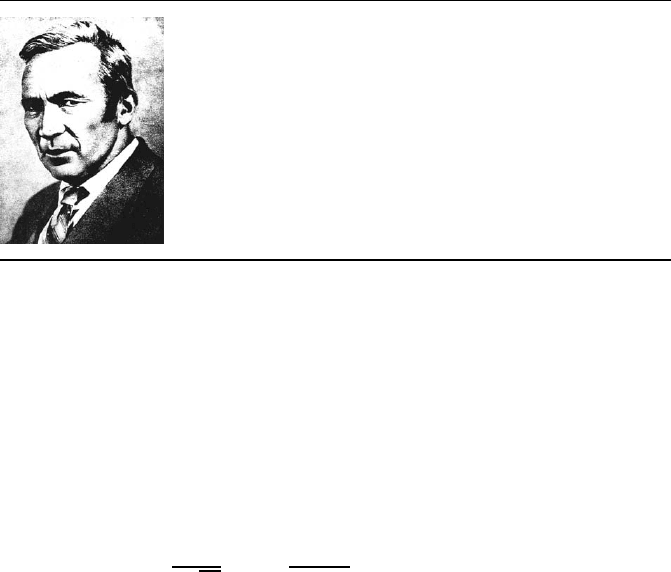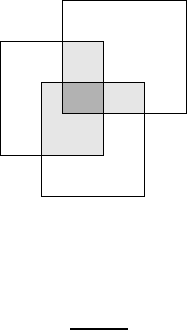Appel W. Mathematics for Physics and Physicists
Подождите немного. Документ загружается.


Exercises 507
Sidebar 7 (Cont.)
The gray string goes behind the rest...
... continues...
... and goe s back to its initial position.
The white string goes behind the black
string...
... and into position.
The black string is now free to take its
original place.
This magic trick (which may very well be done at home, using a pencil eraser, some tacks and
a yard or so of ordinary string) is a consequence of the double connectedness of SO( 3).
Another illustration of this fact is “Feynmann’s hand trick” [36].
Chapter
19
Introduction to probab ility
theory
Statistics is that science which proves
that 99.99% o f human beings have
more legs than the average number.
The goal of probability theory is to provide mathematical tools to discuss rigorously
the elusive c oncept of randomness.
Randomness means in general that we have incomplete knowledge of some system.
Probability theory is interested, for instance, in what can be said of an event when
an “experiment” is repeated a large number of times. For instance, this “experiment”
may be the throwing of a die, and the event might be “the result of the throw is at
most 3.”
However, probability the o ry is not only concerned with “random” events, since it
is also at the heart of the formalism of statistical mechanics, which, at the classical
level, is based on deterministic equations (the Newton equations, in the Lagrangian
or Hamiltonian formalism). It can also be used to describe in a simpler (maybe
incomplete) manner some very complicated distributions, such as in signal theory
or in image processing.
Finally, it should be mentioned that probability theory may be used to discuss vari-
ous events, and — as the case may be — to mislead, bluff, or h oodwink the unsuspecting
public. Although this is not something that students should do, it is important
that they know some of those techniques, not only to be capable of clear scientific
judgment (some experimental results are presented as “proved,”
1
whereas rig orous
statistical analysis shows them to be no better than purely random), but also to
enlighten the daily life o f an informed citizen.

510 Introduction to probability theory
19.1
Introduction
Dice are the embodiment of randomness. The Latin name, alea, is indeed
the source of the French word “aléatoire” for “random.” The Arabic word
az-zahr, which also means “dice,” has produced Spanish azar, French “hasard”
(“randomness”), as well as English “hazard.” The way dice fall, through the
Latin cadere (to fall), has brought the Old French word chaance and then th e
word “chance.”
According to a dictionary, chance is “The unknown and unpredictable element
in h appenings that seems to have no assignable cause.”
This is what happens w ith t he throw of a d ie. Even if we hold tha t t he
laws that dictate the fall and rebounds of the die are perfectly deterministic,
it is a fact that this system is chaotic and thus, in practice, has unpredictable
behavior: the final outcome of the throw has no apparent reason [86].
It is quite remarkable that such a common concept as “chance” should at
the same time be so difficult to fathom. Here is a math ematical example:
Some real numbers have the following property,
2
which we call Property P :
P
the decimal expansion of x contains statistically as many ze-
ros as ones, twos, threes, etc; morevoer, any finite sequence of
digits (for instance, “123456789” or your birthd ate) appears
in the decimal e xpansion and indeed appears statistically as
frequently as any other sequence of the same length (thus
“12345” is as f requent as “94281”).
Mathematicians (in particular, É. Borel) have proved that Propert y P holds
for the overwhelming majority of real numbers. More precisely, the probability
that P holds for a real number x is equal to 1. The probability that P does
not hold is therefore equal to 0.
Now, can you give me a single example of a real number such that Property P
holds?
It should be noted that rational numbers do not have Property P . Indeed,
the decimal ex pansion of a rational number is periodic (for example, 1/7 =
0.142857142857... with an infinite repetition of the s equence “142857”), which
clearly contradicts Property P . Maybe a number such as π, or e, or
p
2 would
work. This is quite possible, but this is a complete mystery at the current
time: nobody has been able to show, for instance, that π h as Property P , nor
indeed that it doesn’t .
So, we know that a “randomly chosen” real number must almost surely
satisfy Property P ; yet, (almost) a ny time we chose a number, either it does
1
E.g., the famous case of “water memory,” which is described in detail in [15].
2
A number for which Property P holds is called a normal number.

Introduction 511
not have this property, or if it does, we are not able to prove it.
3
The conclusion
is that it is in fact very difficult to make a “ random” choice of a real number;
most of our “choices” are not random at all.
4
This simple example should be enough to suggest how difficult it may be to
express rigorously what is a “random choice.” To overcome those dif ficulties,
it has been necessary to formalize and axiomatize probability theory, leaving
aside questions of interpretation to concentrate solely on the mathematical
content.
In this sense, the forefathers of probability are certainly Blaise Pascal (see
page 606) and Pierre de Fermat (1601—1665), during a famous exchange of let-
ters during the summer 1654. The physicist Christiaan Huyghens (1629—1695)
published this correspondance in the first treatise of probability theory, De Ra-
tiociniis in ludo aleæ, where in particular the notion of mathematical expecta tion
is introduced.
However, the works of Jacques Bernoulli (see page 555) and Abraham de
Moivre,
5
with the first theorems concerning laws of large numbers, are the
real star ting point of modern probab ility theory. Laplace and Gauss studied
the theory of errors (with important applications to measurements such as
that of the terrestrial meridian).
In th e ninetheenth century, Pafnouti Tchebychev
6
(1821—1894) and his
students Andrei Markov (1856—1922) and Alexandre Liapounov (1857—1918)
created a formalism suitable for the study of sums of random variables,
which marks t he beginning of the important Russian school of probability
theory. The complete axiomatization of probability is due to Andrei Kol-
mogorov (see below), building on previous work of Sergei Bernstein (1880—
1968), Richard von Mises (1883—1953) and Émile Borel (1871—1956).
3
To be precise, we know a few normal numbers. For instance, the number obtained by first
writing successively all positive integers, the n concatenating the resulting sequences of digits
(Champernowne, 1933):
0, 1234567891011121314151617 . . .
or the number obtained by doing t h e same with the sequence of prime numbers (Erdös and
Copeland, 1945) :
0, 23571113171923293137. . .
It is quite obvious that those numbers are artificial; in particular, they depend on the fact
that we work in base 10. So one may increase the difficulty by asking for an absolutely normal
number, one which is normal (in an obvious sense) in any basis. It seems that today not a
single absolutely normal number is known, whereas, again, “almost all” numbers must have this
property.
4
Consider also the great difficulty inherent in the wri ting of a random number generator
for a computer.
5
Abraham de Moivre (1667—1754) left France at eighteen during the repression against
Protestants. He discovered mathematics through a chance encounter with Newton’s Prin-
cipia [69]. Besides studies of complex numbers, he gave the mathemati cal definition of in-
dependent events, and proved the “Stirling” formula.
6
The mathematical great-great-great-great-grandfather of the translator.

512 Introduction to probability theory
19.2
Basic definitions
In this section, we introduce the b asic vocabulary of probability theory
and the axioms stated by Kolmogorov [19] in Über die analytischen Metho-
den in der Wahrscheinlichkeitrechnung (Analytic Methods of Probability Theory,
1931), and also in the historical book Grundbegriffe der Wahrscheinlichkeitrechnung
(Foundations of Probability Theory, 1933).
The probability of an event that can range only over a discrete set (such as
the result of throwing a die) can b e captured very intuitively. However, when
the space of possible events is continuous (such as the points in space, or an
instant in time), a precise mathematical description of the “probability that
an event occurs” is required.
Kolmogorov suggested that the probability of an event be the expression
of the measure of a set.
DEFINITION 19.1 A probability space is a pair (Ω, Σ), where
• Ω: a set (the sample space).
• Σ: σ-algebra of events, that is, a set such that
i) Σ ⊂ P(Ω) (P(Ω) is the set of a ll subsets of Ω);
ii) Ω ∈ Σ and ∅ ∈ Σ;
iii) if A ∈ Σ, then its complement ∁
Ω
A also belongs to Σ;
iv) if A
n
∈ Σ for any n ∈ N, then
S
n∈N
A
n
∈ Σ.
An element of Σ is called an event. An element of ω ∈ Ω is sometimes called
the result of the experiment Ω, or an atomic or elementary event.
The reader should recognize Definitions 2.7 and 2.10 on page 59. So a
measurable space is a probabilistic space.
Example 19.2 When playing (once) heads or t ails, one can take Ω = {P , F } and
Σ =
∅, {P }, {F }, {P , F }
.
Example 19.3 When rolling once a die with six facets, the space of elementary events can be
Ω = {1, 2, 3 , 4 , 5 , 6} and Σ = P(Ω).
The event “the result of the throw is even” is the element {2, 4, 6} ∈ Σ.
Example 19.4 Take Ω = R. Then both {∅, R} and
∅, [0, 1] , ∁
R
[0, 1] , R
are σ-algebras.
Remark 19.5 Note that it is sometimes useful to take for Ω a “set” which is not an abstract
mathematical object, but rath er a group of persons, a collection of objects, etc.
Basic definitions 513
DEFINITION 19.6 An event A ∈ Σ is realized if the result ω of an experi-
ment is in A.
Working with the σ-algebra Σ, we have at our dis posal on the set of
events the usual set-theoretic operations of union, intersection, and taking the
complementary subset. These have the following intuitive meaning:
• the union of two events A and B, that is, A ∪ B, corresponds to the
realization of A or B (an inclusive “or,” where A and B is possible);
• the intersection of two events A and B, i.e., A ∩ B, corresponds to the
realization of A and B;
• taking the complementary subset corresponds to the realization of the
opposite of A, or equivalently to the no-realization (the failure) of A.
DEFINITION 19.7 Let (Ω, Σ) be a sample probability space A, B ∈ Σ. Two
events A and B are simultaneously realized if the outcome of the experiment
is ω ∈ A ∩ B.
The events A and B are incompatible if A ∩ B = ∅.
A complete class of events is any countable (or finite) sequence of non-
empty events (A
n
)
n∈N
, which are mutually incompatible and which together
exhaust Ω, that is, such t hat
i) A
m
∩ A
n
= ∅ if m 6= n,
ii)
S
n∈N
A
n
= Ω.
Any element ary event {ω} ∈ P(Ω) is th en contained in one and only one of
the elements of the complete class.
DEFINITION 19.8 Let C ⊂ P(Ω) be any set of subsets of Ω. The intersection
of all σ-algebras containing C is a σ-algebra, which is called the σ-algebra
generated by CC
C
C
CC and is denoted σ(CC
C
C
CC ).
Example 19.9 Consider the experiment of rolling a die once. We take
Ω = {1, 2, 3 , 4 , 5 , 6} and we put Σ = P(Ω).
Consider now C =
{1, 2}
. The σ-algebra generated by C is
σ(C ) =
∅, {1, 2}, {3, 4, 5, 6}, Ω
.
On the other hand, if we put C =
{1}, {2}
, we have
σ(C ) =
∅, {1}, {2}, {1, 2}, {3, 4, 5, 6}, {1, 3, 4, 5, 6}, {2, 3, 4, 5, 6}, Ω
.
Having defined these notions, which are basically set-theoretic in nature,
we can use the σ-algebra for th e purpose of defining measures of sets in this
σ-algebra, as in the definition of the Lebesgue integral. A suitably normalized
positive measure will provide the notion of probability.
514 Introduction to probability theory
DEFINITION 19.10 (Probability measure) Let (Ω, Σ) denote a sample space
with a σ-algebra. A map P : Σ → R
+
is a probability (measure) on (Ω, Σ) if :
(P1) P(Ω) = 1;
(P2) for any countable (or finite) sequence (A
n
)
n∈N
of pairwise disjoint
events in Σ, we have
P
S
n∈N
A
n
=
P
n∈N
P(A
n
).
The triplet (Ω, Σ, P) is also called a probability s pace .
Comparing with Definition 2.11 on page 59, we see that a probab ility space
is simply a measure space where the total measure of the space is supposed to
be equal to 1.
The reader is then invited to check the following propert ies:
PROPOSITION 19.11 Let P be a probability measure. Then the following properties
hold:
i) if A ⊂ B, then we have P(A) ¶ P(B);
ii) P
∁
Ω
A
= 1 −P(A);
iii) if A ⊂ B, then we have P(B) = P(A) + P(B \ A);
iv) P(A ∪ B) = P(A) + P(B) −P(A ∩ B);
v) if (A
n
)
n∈N
is an increasing sequence (for inclusion), then we have
P
S
n∈N
A
n
= sup
n∈N
P(A
n
) = lim
n→∞
P(A
n
);
vi) if (A
n
)
n∈N
is a decreasing sequence (for inclusion), then we have
P
T
n∈N
A
n
= inf
n∈N
P(A
n
) = lim
n→∞
P(A
n
).
Example 19.12 Let a ∈ Ω be an elementary e vent. The map
δ
a
: P(Ω) −→{0, 1},
A 7−→
¨
1 if a ∈ A,
0 if a /∈ A
is a probability measure, which is called the Dirac measure or mass at a.
Example 19.13 Let (p
n
)
n∈N
be an arbitrary sequence of non-negative real numbers such that
P
n∈N
p
n
= 1. Let Ω be any set and let (x
n
)
n∈N
be a sequence of e l ements in Ω. Then
P
n∈N
p
n
δ
x
n
defines (in an obvious way) a probability measure on
Ω, P(Ω)
.

Basic definitions 515
Andrei Nikolaievitch Kolmogorov (1903—1987) could not receive any
education from his parents, as his mother died in childbirth and his
father, an agriculturist, was in exile. He was raised by his aunt and
became a train conductor. In his free time, Kolmogorov wrote a
treatise on Newtonian mechanics. His further works dealt with very
varied subjects: trigonometric series, the axiomatization of probabil-
ity theory, the theory of Markov processes, information theory. In
physics, his contributions were important in the theory of turbu-
lence, the study of chaotic systems and dynamical systems (his initial
remains in the acronym “K AM theory,” with Arnold’s and Moser’s).
He also had deep interests outside mathematics, including the poeti c
works of Pushkin.
Example 19.14 Let f : R
n
→ R
+
be an integrable function (with respect to Lebesgu e measure)
such that
R
f dµ = 1. For any Borel subset A ∈ B(R
n
) (recall that the Borel σ-algebra is the
σ-algebra on R
n
generated by op en sets, or equivalently by “rectangles” [a
1
, b
1
] ×···×[a
n
, b
n
]),
let
P(A) =
Z
A
f dµ.
The map P thus defined i s a probability measure on
R
n
, B(R
n
)
.
Example 19.15 Let σ be a positive real number, and let m ∈ R. The Gauss distribution or
normal distribution with mean m and standard deviation σ is the probability measure on R
(with respect to the Borel σ-algebra) defined by
P(A) =
1
σ
p
2π
Z
A
exp
(t −m)
2
2σ
2
dt for any A ∈ B(R).
DEFINITION 19.16 A subset N ⊂ Ω is negligible (for a given probability
measure P) if it is contained in a measurable subset (and event) with probabil-
ity zero:
∃N
′
∈ Σ N ⊂ N
′
and P(N
′
) = 0.
A property p that depends on elementary events h olds almost surely or
is almost s ure if the set of those ω which do not satisfy p, namely, the set
ω ∈ Ω ; p(ω) is false
,
is negligible.
Example 19.17 Let Ω = [0, 1], with the Borel σ-algebra Σ = B
[0, 1]
and the “uniform”
probability measure on [0, 1] (i.e., the Lebesgue measure restricted to [0, 1]). Then for x ∈ [0, 1],
x is almost surely an irrational number.

516 Introduction to probability theo ry
A
B
C
Fig. 19.1 — The Poincaré formula for n = 3. In dark gray, A ∩B ∩C ; in light gray, A ∩B,
A ∩ C and B ∩ C .
19.3
Poincar
´
e formula
Consider two events A and B. Obviously (just using the definition as the
measure of the corresponding e vents) we have the formula
P(A ∪ B) = P(A) + P(B) −P(A ∩ B).
Can this be generalized to more than two events? Let A, B, C be three
events. We can compute
P(A) + P(B) + P(C ) −P(A ∩ B) −P(B ∩ C ) −P(C ∩ A),
but as clearly seen in Figure 19.1, this is not th e correct result for P(A ∪B ∪C ),
because the subset A ∩ B ∩ C has been counted three times, then subtracted
three times. Hence the correct relation is in fact
P(A ∪ B ∪ C ) = P(A) + P(B) + P(C ) −P(A ∩ B)
−P(B ∩ C ) −P(C ∩ A) + P(A ∩ B ∩ C ).
With this done, the general result is easy to guess and prove.
THEOREM 19.18 (Poincar
´
e formula) Let n ∈ N
∗
and let A
1
, . . . , A
n
be arbitrary
events, not necessar ily disjoint. Then we have
P
n
S
i=1
A
i
=
n
P
k=1
(−1)
k+1
P
1¶i
1
<i
2
<···<i
k
¶n
P(A
i
1
∩···∩ A
i
k
).
Proof. A proof using random variables, as defined in the next chapter, is given in
the Appendix D. A n element ary proof by induction is also easy.
